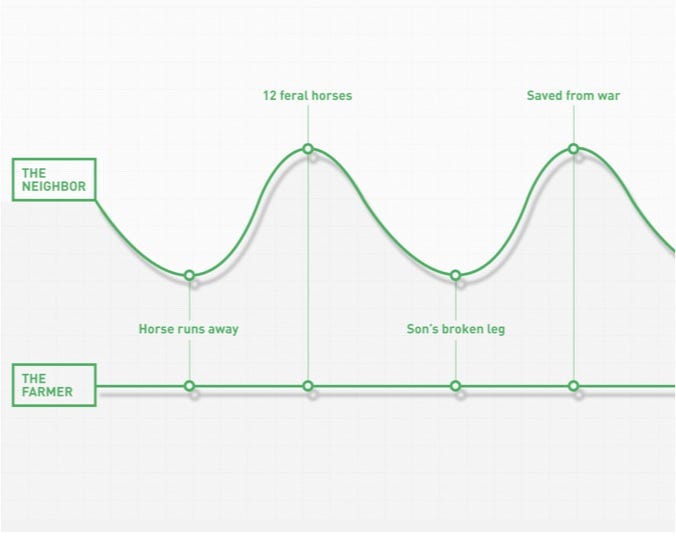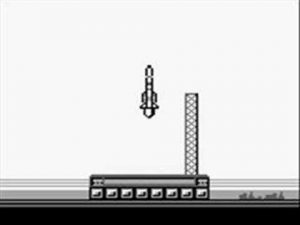If ever forced to choose one philosophy, Taoism seems like a rad path to wander.
One of my favorite Tao parables is about a farmer.
Alan Watts spins a nice esoteric yarn… [hat tip Kottke]
Once upon a time, there was a Chinese farmer who lost a horse. Ran away. And all the neighbors came ‘round that evening and said, “that’s too bad.”
And he said, “maybe.”
The next day, the horse came back and brought seven wild horses with it. And all the neighbors came around and said, “that’s great, isn’t it?”
And he said, “maybe.”
The point, according to Watts’ interpretation of Lao Tzu’s teachings, is “to try to live in such a way that nothing is either an advantage or a disadvantage”.
The whole process of nature is an integrated process of immense complexity, and it’s really impossible to tell whether anything that happens in it is good or bad, because you never know what will be the consequence of the misfortune. Or you never know what will be the consequences of good fortune.

Making the most of whatever comes your way. Flexible. Accommodating. A level of emotional intelligence to remove labels – no good, no bad. Taking responsibility to maintain the flow of the every day, every moment.
Much easier said than done.
The simple always is.
The Tao refers to this idea as Wu Wei – literally, the art of non-action, or non-doing.
The Tao, like life, is a paradox. How do you “do” nothing?
The Wu Wei of the farmer is a great model.
Brue Lee offers another metaphor – “Be like water, my friend.” [Hat tip BrainPickings]
“Be like water making its way through cracks. Do not be assertive, but adjust to the object, and you shall find a way around or through it. If nothing within you stays rigid, outward things will disclose themselves.
Empty your mind, be formless. Shapeless, like water. If you put water into a cup, it becomes the cup. You put water into a bottle and it becomes the bottle. You put it in a teapot, it becomes the teapot. Now, water can flow or it can crash. Be water, my friend.” ~Bruce Lee
I’m tempted to share a personal example. Yet, better left undone.
We ALL live so many examples of Wu Wei every day. Every moment is an opportunity.
If the Game of Life is won with happiness, Wu Wei keeps a smile on your face.
If systems are designed to maximize success, Wu Wei leverages available strengths.
I like this description by Stuart Wilde – find your middle way…
Aligning to nature and its softness is the middle way. It involves no struggle, or confrontation, you can act coherently in life, but you do not need to force your way along, as the emotion of that often pushes things away from you. It’s like the Zen philosophy, it’s a solid calm, it’s the way of love and the path of least resistance. The Tao is full of love because it respects animals and nature, and other humans, also in the calm of the middle way you can communicate more clearly with yourself, aware of your feelings and intuition.
Related Posts:

